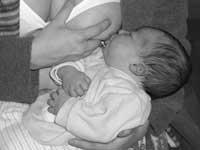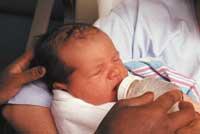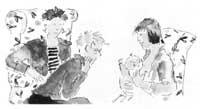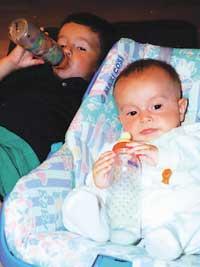Baby feeding (1)
2002/04/01 Lorenzo, Arantza | Uranga, Ane Miren Iturria: Elhuyar aldizkaria
During the first six months, the child needs between 95 and 145 kcal per kg of daily weight and between 80 and 135 kcal per kg of weight in the second half. The 40-50% (between 50-100 g) of this energy should be carbohydrates, fats between 3.8-6 g/kg and proteins 2.2 g/kg (adults need between 0.8-1 g/kg). In addition, the newborn needs more vitamins and mineral salts than adults, always taking into account the proportion of body size.

In newborns, the ideal food to cover all these needs is undoubtedly breast milk. 87% of breast milk is water and has 750 kcal/l. It should be noted that breast milk contains all the foods the child needs and in the proportion he needs.
Comparing breast milk with cow milk we find the following differences:
- Both have a similar amount of energy and fat, but breast milk contains two non-cow essential fatty acids: linoleic acid and linolenic acid.
- Breast milk has more carbohydrates.
- Breast milk has fewer proteins and mineral salts, but they are sufficient for the child's needs. Because of the amount of cow's milk it contains, an overload can occur in the kidneys of the child that can cause problems.
- The breast milk protein is alpha-laktoalbumin, which has no risk of allergy. The cow, on the other hand, is beta-laktoalbumina and has a high risk of allergies.
- Breast milk, unlike cow milk, contains immunoglobulins that contribute to the development of the child's immune system, as well as anti-infective factors. In this way, the child is more protected against diseases and infections.
- In addition to the advantages from the nutritional point of view, it has been proven that breastfeeding has a positive effect, since the child feels more united and cared for with his mother.
For all these reasons, if possible, we would recommend that children take breast milk during the first four months of life. When for any reason it is not possible, we should resort to artificial milks. There are milks or special formulas that are sold for the first four months. To make them more similar to breast milk, cow's milk adapts. Most are spray and in 100 ml of water 15-16 g are emitted.
It is very important to prepare it following the indications established by the producers. Everything has to be an exact amount, and if we throw more dust, in addition to thickening too much, we can overload the kidneys of the child. In case of throwing less, there is a risk of not feeding properly. Also, if the mother cannot breastfeed, she can drink milk at first from the first hours. The first shot should be small (about 30 ml), then in the next few days we will increase the amounts and for the fourth month it has to perform 5 doses of 180 ml per day. In the next issue we will continue feeding children more than four months.

Gai honi buruzko eduki gehiago
Elhuyarrek garatutako teknologia





